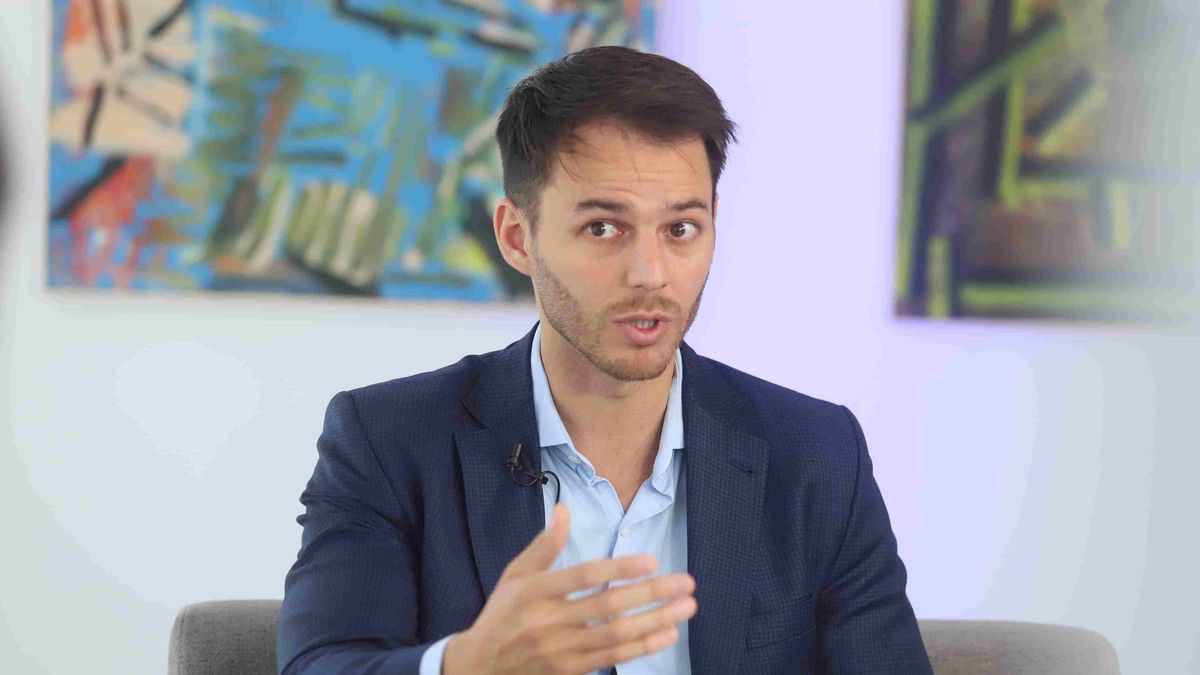Regarding this parallelism, he clarified that “unlike the financial markets, in the real estate sector you do not have a dashboard that tells you the value of the apartments every day. It is something that is seen in the long term, comparing year over year and it is very difficult, especially in Argentina, where there is not so much transparency.”
“Generally that takes time because It is a less liquid market, where capital takes time to arrive and people take time to decide on buying a home, But it is what is coming,” he insisted.
The growth in demand and the importance of mortgage loans
On the other hand, Ginevra highlighted the potential of mortgage loans. “We saw an increase in participation, although it still did not reach the levels of 2017/2018 with the government of Mauricio Macri”, he pointed out.
glikman3.jpg
The interview, conducted by Andrea Glikman, closed the cycle of Ámbito Debate on Real Estate.
And he warned: “Argentina has enormous potential. In other countries in the region, the share of credits over GDP is around 15 or 20% and here it should be 2% today. This means that, if we adjust, this can be multiplied by 10.”
“That is retracted demand. There are people who could not buy today, but with mortgage credit they are going to do so and we are going to have the market flooded. “This demand pressure will have to be accompanied by supply so that prices do not skyrocket,” projection.
At that point, he mentioned the government’s new decree that allows access to financing for developments under construction and added: “What matters is generating trust and for investors to decide, understanding that there will be legal certainty and a country designed in the medium term. ”.
Clear rules of the game and end to bureaucracy
By insisting on this non-short-term thinking, the sector leader highlighted that “in real estate projects, from the moment they are conceived until the first unit is delivered, a minimum of 5 years passes” and noted: “The investor needs a certain predictability of the country and it is a huge barrier to entry.”
“We have to work on reducing these risks and also on streamlining procedures. In the City of Buenos Aires, obtaining a building permit can take one or two years. And that means that a person who has land and wants to invest money, generate work and build a building cannot,” he said.
He also questioned the public hearings for the modification of the City’s urban planning code, considering that “it is proposed that it not be modified for a minimum of 4 years and I think it should take more time, at least 10 or 15 years, because the developers take time to adapt to the new rules, but also the officials. And that delays the permits.”
“The most important thing is macro stability, access to financing for buyers and legal security. This is that the rules of the game are not changed every now and then. We do not ask for a subsidy, but rather we depend on no obstacles being placed on us. That is necessary to have a more vibrant market,” he defined.
“Money laundering is not going to save the real estate market”
In turn, Ginevra stated that money laundering “was beneficial, but it is a short-term blow” and noted: “Operations have been carried out, but It is not something that is going to save the real estate market for the coming years. “I don’t think it’s something as important as it is promoted for the sector.”
The vision at a global level is different. “Although it was lower than what it was during Macri’s time, those 23 million dollars are a good boost for the economy and for people to be able to pour those financial assets into the real economy.” “A lot of money that was under the mattress was dumped, but then we need to have sources of genuine and constant investment”he warned.
The rental law, a global case study
When asked about the rental law, the president of the CIA was critical and considered that “many see it as a global case study” and justified: “You had a law that imposed a contract on you and it was very difficult for the parties freely agree.”
“A form of adjustment, of currency, was established and then the owners did not want it and there was no market. Prices went through the roof and, last December, when the law was repealed, the market adjusted itself, prices dropped and supply increased. We went from one extreme to the other and the improvement was very clear,” he countered.
Expectations for 2025
Looking ahead to next year, Ginevra did not hesitate to affirm that “the credits are going to have a very important role, because they are already growing month by month and the amount of writings is already approaching the levels of Macri’s time.”
He also valued the streamlining of the financial system: “The banks are going quite fast and in a month you can have the credit awarded, which is something positive.”
In parallel, it defused the fear that something similar would happen with the holders of UVA credits. “These people had the problem that their properties decreased in dollars and the fee was above the average salary. But Today real estate is very cheap, at the level of 8 years ago when the world had inflation of more than 40% in dollars. And possibly the biggest year-on-year increase in real estate values is coming,” he highlighted.
The behavioral changes of the new generations
Finally, Ginevra alluded to cultural changes. “There are generations after the millennials who are born with iPhones and Uber. They relate differently to investments and do not want to hold on. They do not want to buy a car or a home or they do so seeing it as an investment and perhaps they focus more on renting. because they see the flexibility of moving between cities or getting bigger if they get married and smaller if they get divorced,” he warned.
In any case, he clarified that “people continue living in apartments and continue buying,” mainly in relation to “luxury markets”, while mentioning as buyers “large investment funds, like BlackRock, that use them as an investment to rent them, because they understand that it is a business.”
“This happens internationally and this trend can come to Argentina, where young people prefer to bury their capital in more liquid assets such as cryptocurrencies or shares of funds that in turn invest in real estate,” he highlighted.
Source: Ambito
David William is a talented author who has made a name for himself in the world of writing. He is a professional author who writes on a wide range of topics, from general interest to opinion news. David is currently working as a writer at 24 hours worlds where he brings his unique perspective and in-depth research to his articles, making them both informative and engaging.




